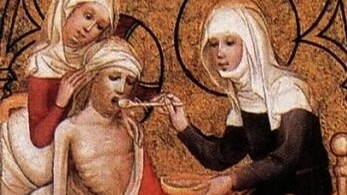On November 17th the Catholic Church and Franciscans worldwide celebrate the life of St. Elizabeth of Hungary – a medieval noblewoman who responded to personal tragedy by embracing St. Francis’ ideals of service and care for the poor. The daughter of the King of Hungary, Elizabeth chose a life of penance and asceticism when a life of leisure and luxury could easily have been hers. This choice endeared her in the hearts of the common people throughout Europe.
Franciscan Media describes her life and influence this way: “In her short life, Elizabeth manifested such great love for the poor and suffering that she has become the patroness of Catholic charities and of the Secular Franciscan Order. The daughter of the King of Hungary, Elizabeth chose a life of penance and asceticism when a life of leisure and luxury could easily have been hers. This choice endeared her in the hearts of the common people throughout Europe.
At the age of 14, Elizabeth was married to Louis of Thuringia, whom she deeply loved. She bore three children. Under the spiritual direction of a Franciscan friar, she led a life of prayer, sacrifice, and service to the poor and sick. Seeking to become one with the poor, she wore simple clothing. Daily she would take bread to hundreds of the poorest in the land who came to her gate. After six years of marriage, her husband died in the Crusades, and Elizabeth was grief-stricken. Her husband’s family looked upon her as squandering the royal purse, and mistreated her, finally throwing her out of the palace. The return of her husband’s allies from the Crusades resulted in her being reinstated, since her son was legal heir to the throne. In 1228, Elizabeth joined the Secular Franciscan Order, spending the remaining few years of her life caring for the poor in a hospital which she founded in honor of Saint Francis of Assisi. Elizabeth’s health declined, and she died before her 24th birthday in 1231. Her great popularity resulted in her canonization four years later.”
Like so many Franciscans before her, St. Elizabeth stood as a model of selfless charity and care
for others. She saw the dignity and worth in every person and served each individual as if they were Jesus Christ. Here at Viterbo, St. Elizabeth invites each of us to remember our Franciscan mission to love those on the margins with open minds and hearts.
St. Elizabeth of Hungary, friend of the poor —pray for us!

